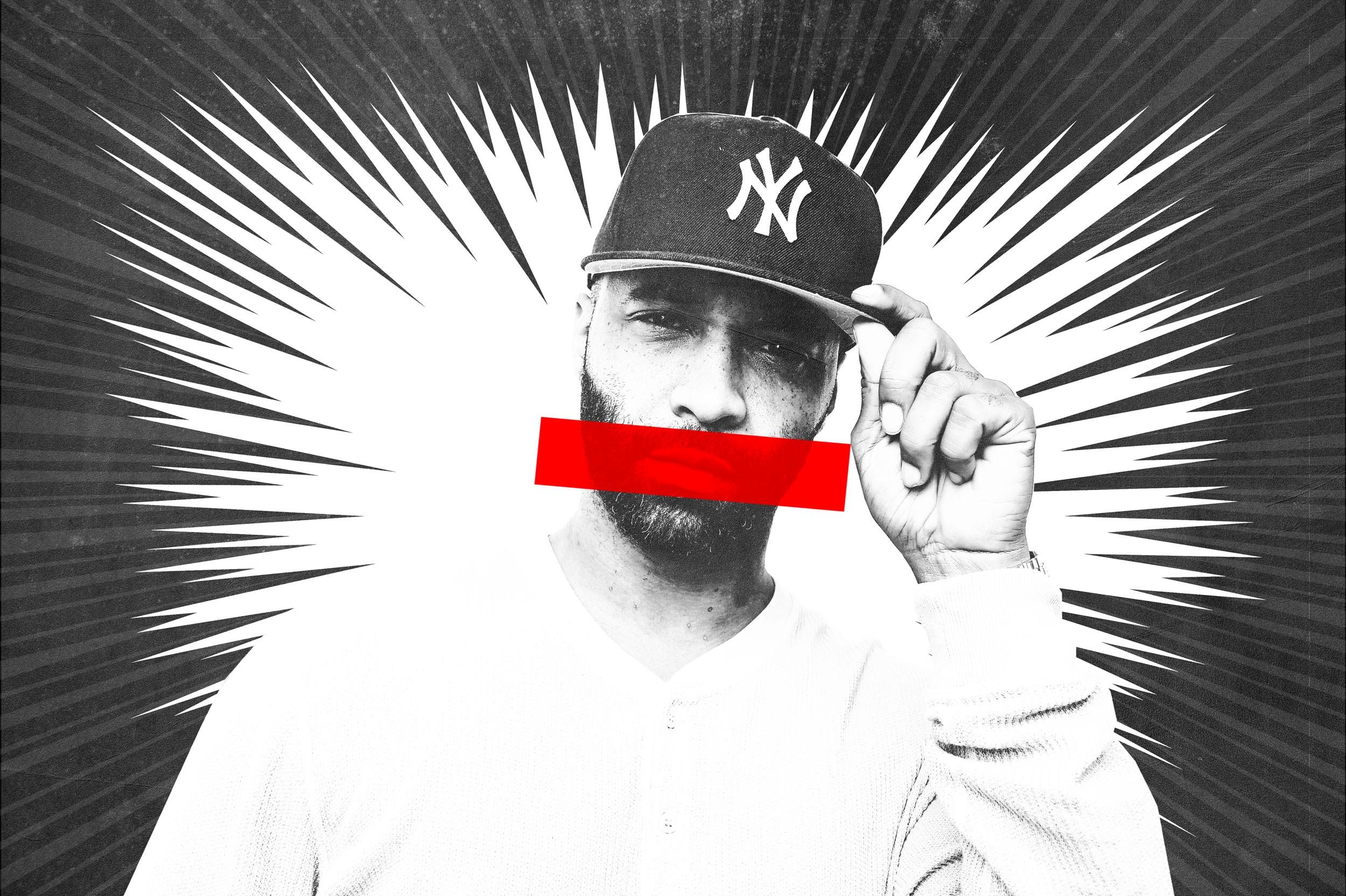Joe Budden Gets Paid to Hate
How the perennial loudmouth turned a contentious career in rap and reality TV into a new life as hip-hop’s preeminent media pundit on a daily web talk show called ‘Everyday Struggle’"Rap Twitter usually deals with things on a very surface level," says the notoriously argumentative rapper Joe Budden, now a cohost of the spirited web talk show Everyday Struggle. "We peel the layers back. [Cohost] Akademiks is gonna give me every single thought from a consumer perspective, and I’m gonna shit on all of it," he says. "Because I hate consumers."
"Hate" is the operative word in Budden’s relation to most things. Joe Budden is a hater. He isn’t built for the modern digital economy of likes. On Everyday Struggle, and in general, he speaks from a position of permanent dissent. Which isn’t to say that Budden isn’t constructive with his criticism. After all, he’s worked in the music industry — with as many failures as successes — since 2000. With 17 years’ worth of career insights, Budden brings an ex-jock’s sort of perspective to a show that’s very much modeled off of ESPN’s success with the talking-head format.
Complex Media — a millennial-targeting news and lifestyle web brand and (disclosure) my former employer — produces daily episodes of Everyday Struggle to turn trending Rap Twitter conversations (Lil Yachty’s longevity, Meek Mill’s comeback, Nicki Minaj vs. Remy Ma) into captivating video content. These aren’t boilerplate news segments, but staged, dramatic take showdowns. "What makes sports commentary so compelling is that you have this mix of journalists and retired players," says Complex chief content officer Noah Callahan-Bever, who created the show. "The beauty of retired players is that they can be completely unfiltered because they no longer have to worry about their relationships with franchises, ownerships, or teammates." Everyday Struggle is host-driven, with only five interviews so far in its six-week run, so Budden is hardly worried about alienating sources or talent. "I don’t make calls," he says. "I’m not looking to confirm or deny some shit. I’m just gonna give my opinion on it. This is an opinion-based show. I don’t want to talk to people. I don’t want guests. I only want to talk to Nadeska and Akademiks."
So, every morning, Monday through Thursday, three irreconcilable perspectives gather to get a head start on the day’s music news. Budden, DJ Akademiks (real name Livingston Allen), and the Complex News anchor Nadeska Alexis debate new songs and the latest hip-hop gossip with louder conviction than is strictly necessary. On set, there’s a row of blue and white Everlast boxing gloves arranged under the table just so you know that it could go down at any moment.
Everyday Struggle isn’t the first time that a media company has slotted breakout Rap Twitter personalities into a live-action format. The comedy duo Desus and Mero, who previously worked with Complex and MTV2, now anchor a nightly, self-titled talk show on Viceland. Desus & Mero and Everyday Struggle both take their programmatic cues from ESPN’s lightning-round talk shows Pardon the Interruption and First Take. (Erik Rydholm created Pardon the Interruption, and he produces Desus & Mero for Viceland.) But where Desus & Mero is a happy, relaxing half hour where two amicable comedians laugh at each other’s jokes and make their guests feel at home, Everyday Struggle is a knock-down, drag-out battle between Budden and Akademiks — two men starkly separated by age and disposition. Akademiks, 27, is yappy and enthusiastic. Budden, 36, is dismissive and brutal. Alexis, our dear moderator, is slick and unflappable. It’s a lively dynamic, prone to explosion whenever Budden and Akademiks broach even the slightest disagreement about the most fleeting genre concern.
The show’s hottest topic as of late has been the relentlessly upbeat, teenybopper rapper Lil Yachty — a hater’s archnemesis. In the past year, the 19-year-old has drawn attention to hip-hop’s most contentious intergenerational rift. The old guardsmen have invoked Yachty as a sign of rap’s disintegration as lyrical craft. Budden and Akademiks have sparred over Yachty since the premiere of Everyday Struggle. In May, as Yachty was making the press rounds to promote his debut album, Teenage Emotions, the young rapper sat with Budden, Akademiks, and Alexis as their show’s first guest. Naturally, Budden dominated the interview, seizing the opportunity to call Yachty’s goofy trolling and happy-go-lucky ignorance a shtick to the rapper’s face. "You would be lying to tell me that, as a young man in this industry, in this music industry, in the music business, you are happy 24–7," Budden yelled at Yachty, who took the older rapper’s volleys in stride. "That is a lie! That is bullshit. And I refuse to have somebody tell me bullshit! I want to have an honest conversation!"
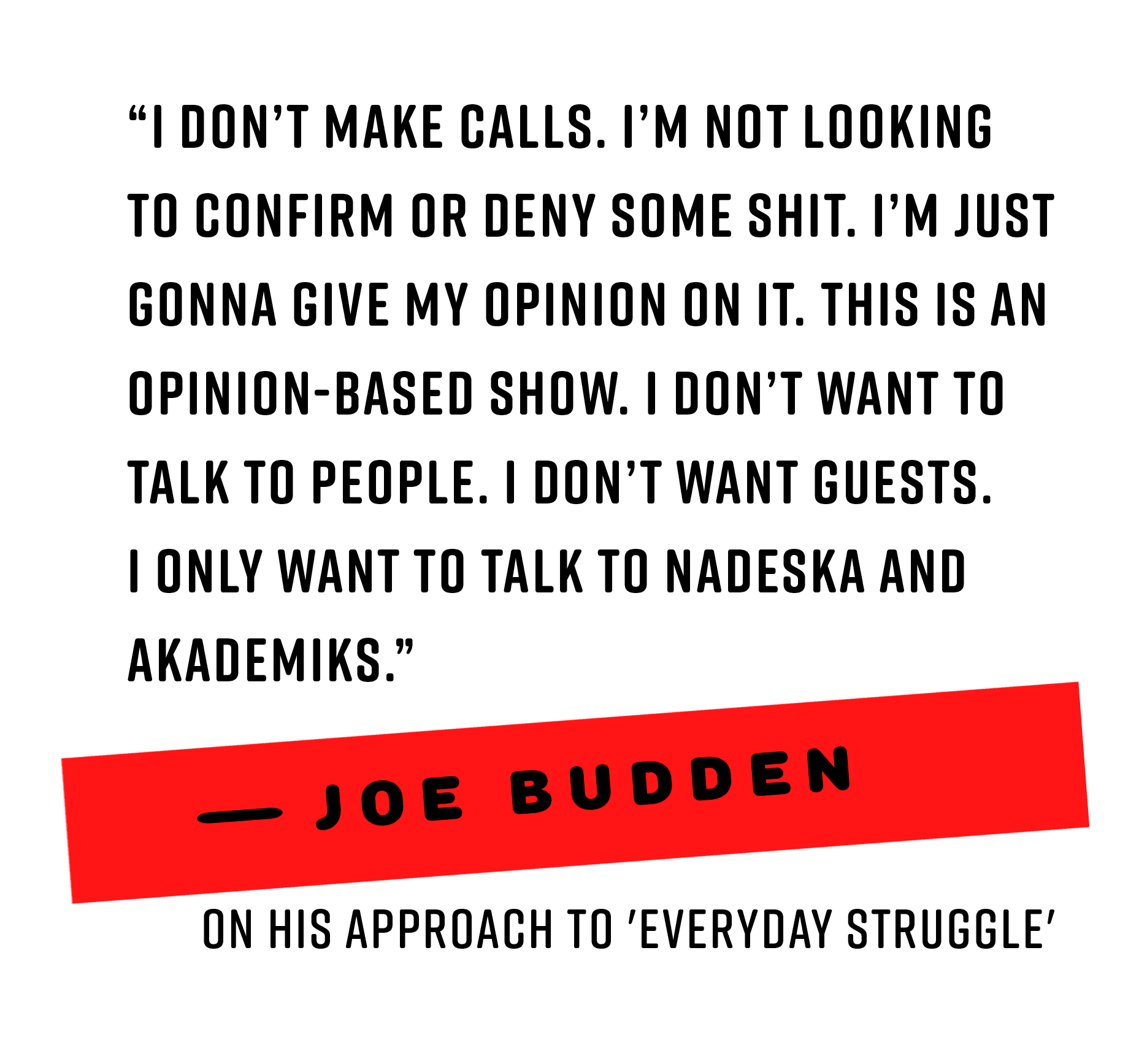
The Everyday Struggle interview with Lil Yachty is the show’s most-watched episode to date. It’s also the most memed episode, having yielded a classic image of Budden shouting painfully into the void. On YouTube, the full, nearly 47-minute interview has earned 1.4 million views. (Other recent episodes have averaged around 400,000 YouTube views each.) As much as that’s due to Yachty’s ability to draw an audience as a breakout artist, it’s also a testament to Budden’s ability to spin entertaining conflict with anyone at any time.
"My most recent therapist told me that I can be a bit intimidating and overpowering in presence, and that I should always be cognizant of it," Budden tells me after a recent taping as he’s seated next to his cohosts.
"Wow," Alexis interjects. "That’s deep."
"And you’re not cognizant of it," Akademiks adds, "so you did not take the advice."
The three cohosts all swear that their on-air opinions are real — no one’s trolling, no one’s faking the funk — but they take it all in stride. "As vulgar or childish as it may seem," Akademiks says, "these are real differences we have in opinion, stances, whatever. I believe we’ve built a nice dynamic, and we’ve gotten to a good place of dialogue, but we still don’t agree on a ton of shit."
For Budden, Everyday Struggle is the soap box he’s always dreamed of. "Before I took this job," he says, "I would turn on the TV in the mornings, and I would see Stephen A. Smith. I would watch him from 10 to 12. Then, I’d get in my car and go about my day. I’d put the radio on — I only listen to talk radio — and I’d hear Stephen A. Smith. Then, I would get home, and I’d turn the game on, and I would see Stephen A. Smith again. Do you see what I mean? There’s a lot of different areas that he needs to be functional in, and it requires different attributes." Budden is doing his best to realize Stephen A.’s blueprint in himself. "I’ve done radio, I’ve done reality television, I’ve been on major labels, I’ve been independent, I’ve been a mixtape phenomenon, I’ve done battle rap. I’ve done a lot," he says. And Budden swears up and down that this latest tangent of his career — full-time video punditry — was his great aspiration all along.

For such an angry introvert who supposedly doesn’t play well with others, Budden has spent a great share of his career flourishing as a cast member rather than a solo performer.
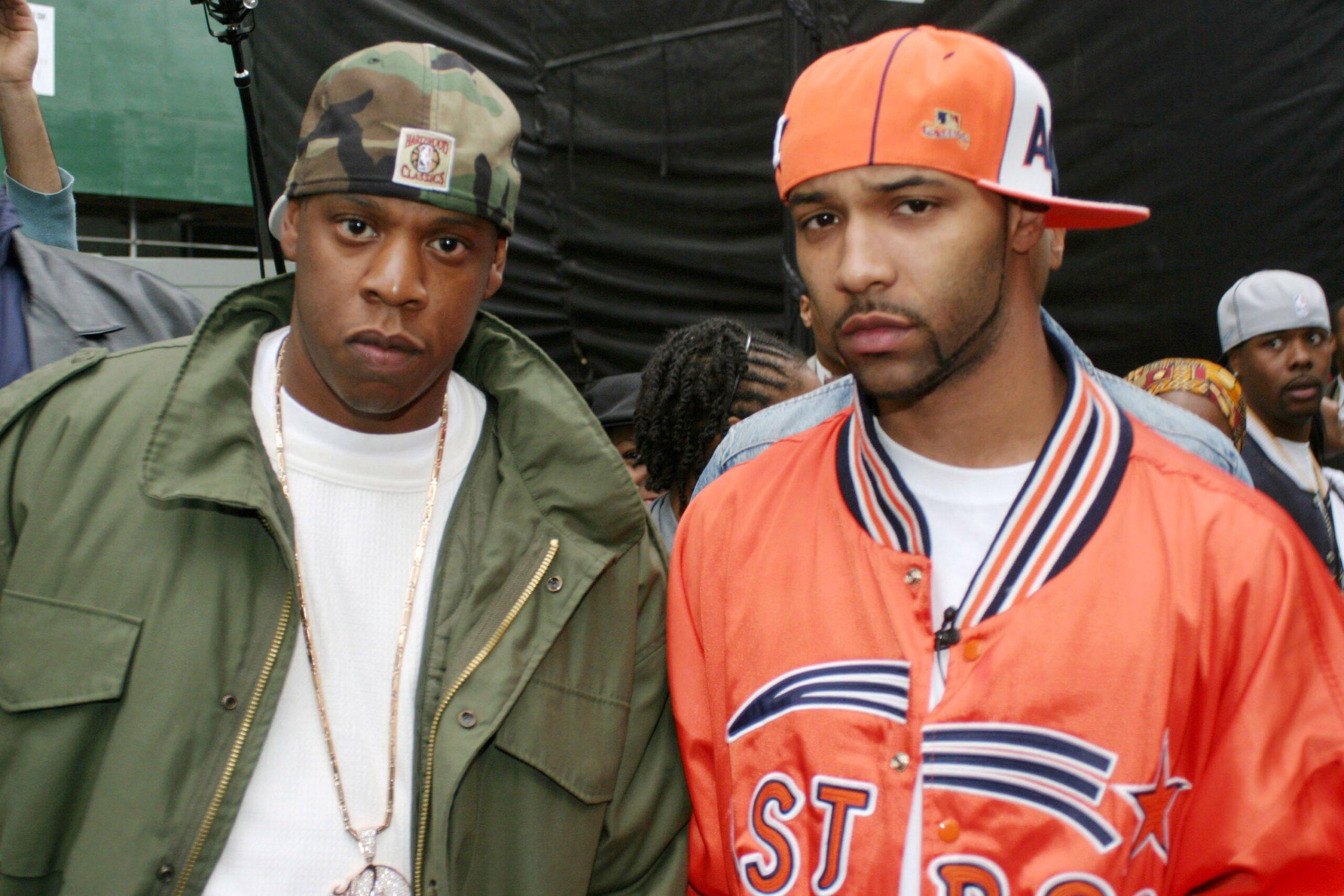
Budden grew up in Jersey City with an ear toward New York. He dropped out of high school and graduated instead from rehab for drug addiction at age 17. He got his start rapping on the tri-state mixtape circuit in his late teens, and former Def Jam executives Kevin Liles and Lyor Cohen signed Budden to his first recording contract at age 20. In spring 2003, he released his then-forthcoming debut album’s first single, "Pump It Up." The song, produced by Just Blaze, is a thumping, staccato club record that was catchy and accessible enough to make its way into promotional trailers (Meet the Blacks), film soundtracks (2 Fast 2 Furious), and video games (Madden NFL 2004), thus launching itself to no. 38 on the Billboard Hot 100. It is, to date, Budden’s only Top 40 hit, though it now serves as a quaint souvenir of a hard-core rapper’s mainstream phase. At the time, though, "Pump It Up" locked Budden into the hip-hop conversation during New York City’s final decade as the genre’s de facto capital.
In 2004, he briefly cohosted a morning talk show on Hot 97. This was Budden’s first broadcasting gig, which Liles implored Budden to quit to go finish recording his sophomore album. Once Liles and Cohen both left Def Jam for Warner Music later that year, however, Budden’s rollout ground to a halt. Budden claimed that Def Jam’s new president, Jay Z, had stalled his album’s release, and three years’ worth of drama ensued before Budden was emancipated from Def Jam in the fall of 2007.
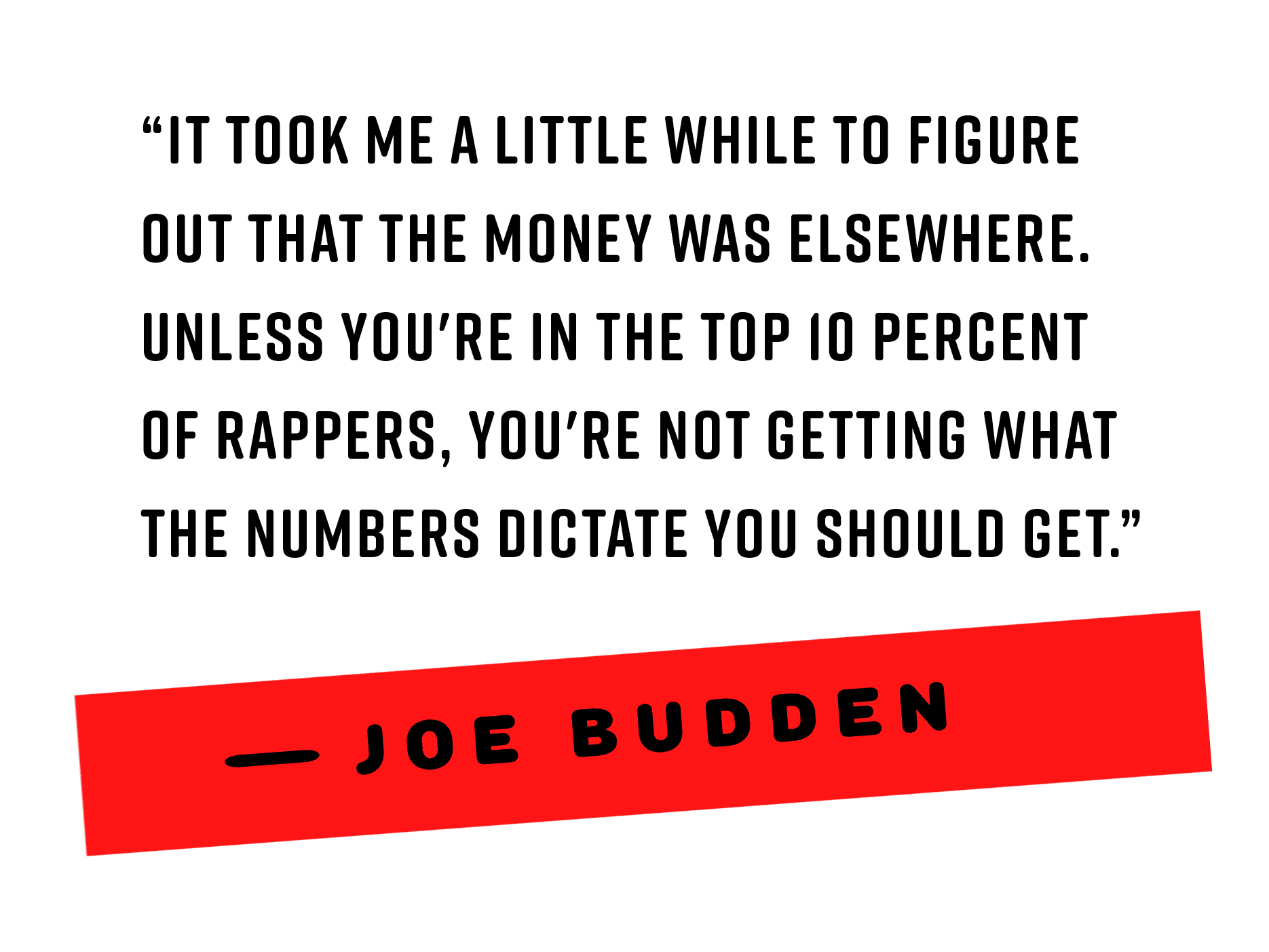
In his 20s, Budden made accessible records about love and war in the club, and he wore baggy jeans, oversized throwback jerseys, durags, and slight ice: standard East Coast rapper attire in the early aughts. Back then, Budden didn’t stand out from rap’s middle echelon so much as he blended into the ’00s hip-hop zeitgeist — though his resounding bark, and the sharpness of his attitude and punch line–heavy lyrics, held clues to his future path.
Budden grew out of his And 1 phase quickly. In the years after "Pump It Up," Budden drifted from club rap toward a harsher style and trickier lyrical constructions. He stopped writing big hooks. Instead, Budden made angry songs about romance and depression. In his Mood Muzik mixtape series — which spans six projects released between 2003 and 2010 — Budden rapped about depression, self-harm, addiction, and rotten relationships. Joe Budden, the persona, was a sad sack with anger management problems and a penchant for oversharing. Outside of his songs, he would spend hours online each day tweeting about music and women. He was a Twitter talking head when the medium was much coarser and less regulated. "A lot of these fucking pundits," Budden says, "they stay stupid shit, and you never hear them say when they were wrong about it. I won’t pretend to know everything. I give my opinion. I’m opening dialogue. That’s all."
In 2008, Budden fell in with fellow lyrical specialists Royce da 5’9", Joell Ortiz, and Crooked I, who together formed the combative, lyrical powerhouse rap group Slaughterhouse (imagine if the Suicide Squad was all battle rappers). Royce has struggled with alcohol addiction, and Budden with pill addiction; both men have extensively discussed their personal turmoil in interviews, and they’ve chronicled it in their music. Slaughterhouse was a halfway house where four brawny lifers could bring the best out of one another.
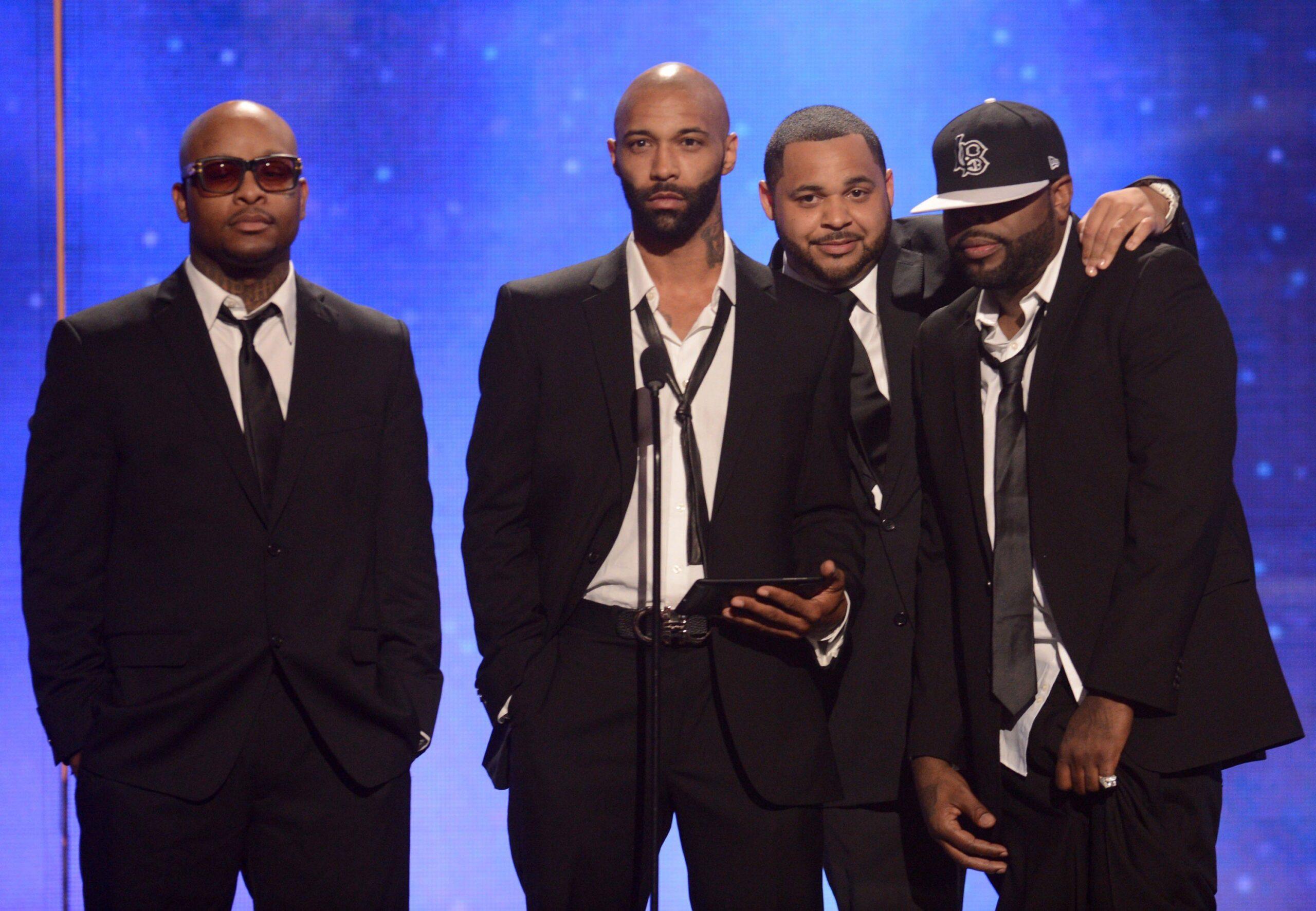
Such camaraderie and teamwork notwithstanding, Joe Budden is a bit of a curmudgeon. He fights. He beefs. He quarrels. He’s always gone out of his way to comment, often savagely, on other rappers’ music and movements. Before cofounding Slaughterhouse in 2008, Budden and Royce butted heads a year earlier over Royce’s battle-rap cred. For years, Budden directed dis tracks and bitter quotes at Game, Brooklyn rapper Saigon, cloud rap godfather Lil B, and Wu-Tang Clan stars Method Man and Raekwon. Budden, a noted battle-rap advocate, tends to view rap as sport in the literal sense that requires conflict.
In August 2009, it’s alleged that Raekwon’s affiliates jumped Budden at a Rock the Bells tour stop in San Bernardino, California, after Budden took issue, via a YouTube video, with Method Man’s placement above him in a "Best Rapper Ever" ranking published by Vibe. Immediately following his altercation with Raekwon’s street team, Budden took to his live stream, holding an ice pack to his swollen face, to dismiss the incident as "a faggot move." Royce da 5’9" eventually intervened to de-escalate the tension between his two friends. Budden says, "It took Method Man telling me, ‘You’re extremely talented. We all love you. We all fuck with you. What are you doing? What are you doing? If you continue to do this, it takes away from how we view you.’"
Method Man’s feedback may have been true with regard to Budden’s esteem among rappers, but at the time it was also apparent — and remains so to this day — that many fans are compelled to watch Budden as a merchant of messy, intimate conflict. Naturally, he escorted himself to reality TV, where producers encourage this sort of unrelenting drama as a matter of course.
In 2012, the VH1 producer Mona Scott-Young recruited the model Tahiry Jose to the cast of Love & Hip-Hop: New York in Season 3. Jose was dating Budden at the time, and so Budden entered Love & Hip-Hop as a supporting character. But Budden and Jose were a package deal in the public imagination, so dramatically entangled on the show and online that the thought of one necessarily invokes the other, even now that they’ve been apart for nearly four years. From roughly 2008 through 2013, the two dated on and off. They cheated on each other. They argued privately and publicly. They made a great mess of one another in the press. After two contentious seasons, Jose and Budden both left Love & Hip Hop in 2014.
Six months after Jose and Budden’s final appearance aired, another woman alleged that Budden followed her to a restaurant in Washington Heights and violently dragged her from the premises in a romantic dispute. Budden ultimately pled guilty to disorderly conduct related to the altercation last year, and the more serious charges against him were dropped. Still, the extremes of Budden’s anger management issues mean he’s no longer totally reckless in his music and persona. "I don’t joke around about hitting women," Budden says. "I’m not allowed to joke that way anymore because a woman has made claims, that’s very serious, and I’m very sensitive to it. I’ve never hit a woman but you can’t joke like that anymore." He and hip-hop dancer Kaylin Garcia split after spending a fraught year together in Couples Therapy on VH1. It would be his last regular role on reality TV, though his exploits with current partner Cyn Santana are regularly broadcast via his Instagram feed.
It was during his reality TV stretch that Budden released the (dare I say) softest, most R&B-forward hooks of his career on three complementary projects, No Love Lost, Some Love Lost, and All Love Lost — the last of those projects dropping in October 2015. The same year, Budden launched his own podcast, I’ll Name This Podcast Later (which later rebranded as The Joe Budden Podcast), thus returning to rap commentary for the first time since his departure from Hot 97 in 2004. When Budden used the podcast to taunt his longtime frenemy Drake last spring, Drake responded with choice words on a French Montana single, "No Shopping": "Pump, pump, pump it up / She got a good head on her, but I pump it up / I’m not a one-hit wonder, they know all my stuff / You let me turn into the nigga that you almost was."
I should note here that Drake is perhaps the last person on Earth to taunt Budden with a "Pump It Up" joke: for nearly a decade now on Black Twitter, the simple mention of "Pump It Up" has been a shorthand punch line summarizing his long and dramatic digression from mainstream success as a musician. But Budden doesn’t regret much. Since as far back as 2003, he says, he’s thought, "Music is not forever. When this is done, I’ll try my hand at something else."

In September 2016 — seven months before the series premiere of Everyday Struggle — Budden and Alexis went skydiving together in New Jersey. It was Budden’s idea. Complex produced the segment, hosted by Alexis, to promote Budden’s latest album, Rage & the Machine. "He spent the first hour shitting on Complex," Alexis says. "He feels like people just sit around here and troll rappers." It was during this trip that Alexis convinced Budden that bloggers and critics — a rapper’s standard enemies — aren’t the worst people in the world. They love rap music, and they play invaluable roles within a genre where fans are uniquely obsessed with artist deathmatch comparisons and "greatest of all time"–sized hyperbole. Rap criticism "should evoke some type of emotion," Budden concedes. And Joe Budden is nothing if not emotional. So Callahan-Bever ultimately sold Budden on the show, and they both settled on Akademiks as cohost shortly after Callahan-Bever called the Ohio-based video blogger in to meet him and Budden for the first time. "When I met [Akademiks]," Budden says, "I felt like we had a hit."
Now, Complex sends a car to New Jersey for Budden each morning, and he arrives at the company’s Rockefeller Center headquarters for a 7 a.m. call time. In the green room, Budden, Akademiks, and Alexis huddle around production notes, three breakfast sandwiches, and an open bottle of Hennessy (no one admits to sipping from it, though Budden sits closest to it), gaming out the day’s topics before they hit the studio and record for about an hour. They wrap by 10 a.m., and the producers rush the day’s episode onto YouTube before noon. Thus, Budden concludes his work day before most rappers are even awake. "I never really identified with being a rapper, if we’re being totally honest," Budden says. "Rappers drink. Rappers smoke. Rappers fuck a whole lot of women. Rappers go to clubs every night. Rappers stand on couches. Rappers carry weapons. Rappers wanna fight everybody. Rappers are tough. I’m not any of those things."
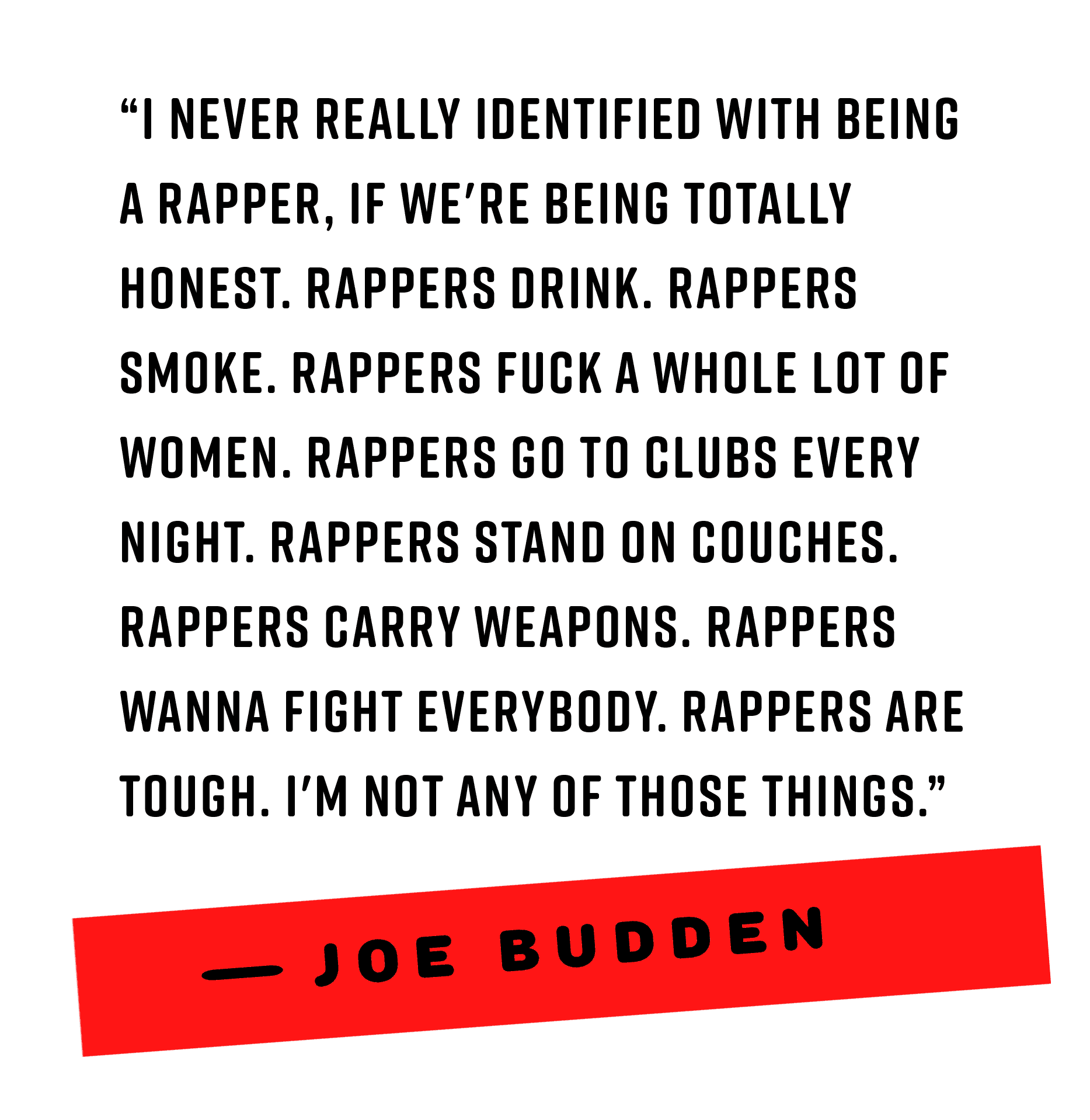
Six weeks into cohosting Everyday Struggle, Budden says he’s "retired" from rap. Clearly, he’s joking — he tells me rap is his "passion" — but honestly who, apart from his dwindling mixtape fandom, would blame him for switching professions? Music industry revenue has crashed. Streaming services pay artists pennies in royalties. Budden thinks about the beloved Brooklyn rapper Sean Price, who died in August 2015, aged 43, in such dire financial straits that fans — including Jay Z and Eminem — had to crowdfund support for his family. "You’re talking about one of the best rappers to ever touch a microphone," Budden says. "That’s no way to live. That’s just not a comfortable way to live going into 37, planning your 40s. No, no, no, I won’t do it."
Budden thinks modern rappers, young and old, need to find new lines of work, possibly juggling several profitable pursuits at once. Budden’s older peer N.O.R.E. — a fellow rapper turned celebrity Black Twitter pioneer — found success in life after rap with his own popular interview podcast, Drink Champs, which is produced by CBS Radio.
In his viral showdown with Lil Yachty, Budden repeatedly stressed that he identifies with Lil Yachty as a rapper first and foremost. He didn’t grill Yachty’s musical style, and he only briefly criticized his personal branding in petty asides. All Budden wanted to know is whether Yachty’s finances are in order, and whether he’s thought his bankability through to age 25. The teenager answered yes, his money’s straight; and no, he hasn’t thought that far ahead, he’s just taking things day by day.
Yachty and Budden do agree on one indisputable fact of life: There is no money in rap music itself these days. "It took me a little while to figure out that the money was elsewhere," Budden tells me. "Unless you’re in the top 10 percent of rappers, you’re not getting what the numbers dictate you should get." In his Everyday Struggle interview, Yachty conceded that he prioritizes personal brand over musical craft, and that his brand management, not his musicianship, is what distinguishes him from his closest peer, Philly rapper Lil Uzi Vert. Yachty can’t rap worth a damn, but he can grab, and hold, popular attention. Before he had any hit singles to speak of, he had his name in headlines for a scandalous statement about a dead rapper: the Notorious B.I.G. is "overrated," Yachty told Billboard. That’s a take. That’s a troll. Maybe he could be Budden’s successor once the latter retires for real.
"If Complex wasn’t paying me," Budden insists, "I would never talk about Lil Yachty." Budden spent the past decade and change talking reckless pro bono, and so I doubt that — but his beef is top-grade. He’s earned his premium.
